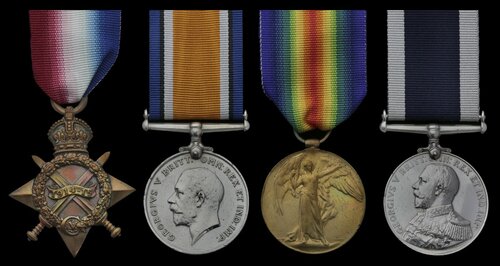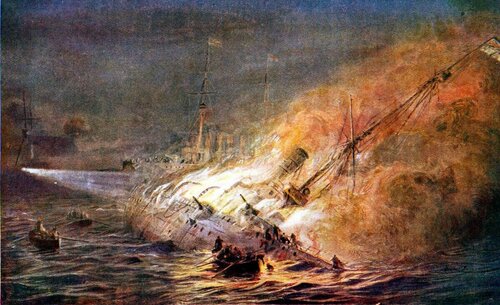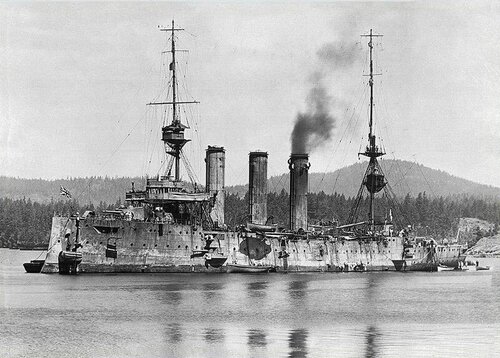Auction: 22001 - Orders, Decorations and Medals
Lot: 210
The Great War campaign group of four awarded to Petty Officer J. A. May, Royal Navy, who was present at Vice-Admiral Sir Frederick Sturdee's celebrated victory off the Falklands on 8 December 1914
On that memorable occasion, May's ship - the heavy cruiser H.M.S. Cornwall - was hit 18 times but nonetheless closed the S.M.S. Leipzig to a few hundred yards and laid waste her guns and decks
1914-15 Star (227076 J. A. May, L.S., R.N.); British War and Victory Medals (227076 J. A. May, P.O., R.N.); Royal Navy L.S. & G.C., G.V.R., 2nd issue, fixed suspension (227076 J. A. May, P.O., H.M.S. Furious), light contact marks, nearly very fine (4)
John Albert May was born in Liverpool on 5 November 1887 and joined the Royal Navy as a Boy 2nd Class in July 1903. Advanced Leading Seaman on 11 August 1913, he was serving in the heavy cruiser H.M.S. Cornwall on the outbreak of hostilities, and he remained likewise employed until March 1917.
He was consequently witness to Cornwall's memorable part in the celebrated battle of the Falklands on 8 December 1914, when she contributed to the destruction of the S.M.S. Leipzig.
The Coronel avenged: victory off the Falklands
In response to the Royal Navy's loss of two armoured cruisers at the battle of the Coronel off Chile in November 1914, Vice-Admiral Sir Frederick Sturdee's squadron was ordered to the South Atlantic to take-on Admiral Graf Maximillian von Spee's victorious force. The former arrived at the Falklands on 7 December 1914, where Cornwall was granted permission to put out her fires and clean her boilers.
Sturdee had planned to re-coal his squadron from two available colliers and then commence his search for von Spee the following day. But the latter saved him the effort, looming up off Port Stanley on the morning of the 8th to destroy the local radio station. The appearance of von Spee's squadron took Sturdee by surprise but the battleship Canopus's 12-inch guns drove the German force off, thereby winning vital time for the Cornwall to raise steam.
By 10.30 a.m., Sturdee's squadron was ready to put to sea, the whole under orders to commence a 'general chase' and it soon became apparent that his two battle cruisers were quickly gaining on von Spee's squadron. They opened fire at about 1 p.m. and straddled the light cruiser Leipzig. Left with little alternative, von Spee ordered his squadron to scatter.
Taking advantage of the situation, Cornwall, and her sister ship Kent, and the light cruiser Glasgow, set off in pursuit of Leipzig, although Kent later made haste for Nurnberg. Because Glasgow was unarmoured, she was compelled to keep her distance, but Cornwall risked incoming shellfire and closed the range to 7,000 yards and set Leipzig on fire at 6 p.m. Five minutes later, Leipzig ceased fire, persuading Cornwall and Glasgow to approach to 5,000 yards to take her surrender.
But Leipzig did not strike her colours, thereby compelling Cornwall and Glasgow to fire several further salvos, causing havoc among Leipzig's crew who were now in fact preparing to abandon ship - it transpired her colours could not be struck because the mast was engulfed by flames.
At 8.12 p.m., Leipzig fired two green flares and Cornwall and Glasgow closed to 500 yards to lower their boats and pick-up survivors, but just 18 Germans were rescued in the darkness after Leipzig capsized.
For her own part, Cornwall was hit 18 times during the engagement but suffered no fatalities. Elsewhere, Sturdee's squadron had accounted for the armoured cruisers S.M.S. Scharnhorst and S.M.S. Gneisenau and won a resounding victory. Only the light cruiser Dresden escaped but she was hunted down in March 1915.
Postscript
Having departed Cornwall in March 1917, May's final wartime appointment was in the light cruiser Cassandra from June 1917 to December 1918, in which period he was advanced to Petty Officer.
Having then been awarded his L.S. & G.C. Medal in November 1926, he was pensioned ashore in the following year, when he enrolled in the Royal Fleet Reserve.
Recalled on the renewal of hostilities in September 1939, he served at the Ramsgate Coastal Forces' base Fervent and at the gunnery establishment Excellent, prior to being invalided out of the service from the R.N.H. at Barrow Gurney in Somerset in December 1940.
Subject to 20% VAT on Buyer’s Premium. For more information please view Terms and Conditions for Buyers.
Sold for
£230
Starting price
£130









